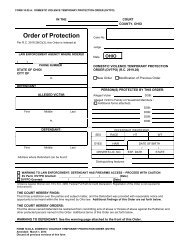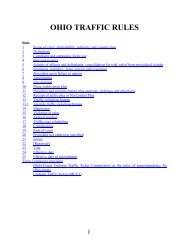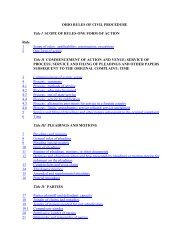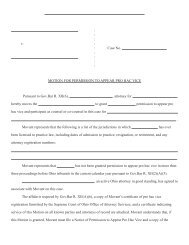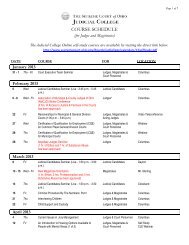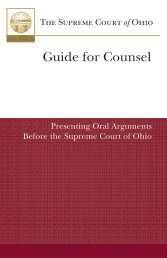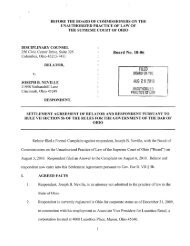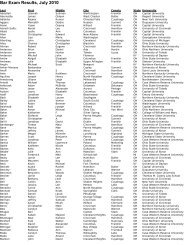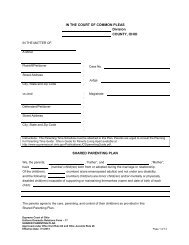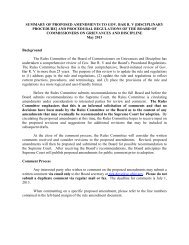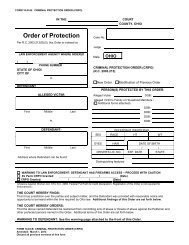disciplinary handbook: volume v - Supreme Court - State of Ohio
disciplinary handbook: volume v - Supreme Court - State of Ohio
disciplinary handbook: volume v - Supreme Court - State of Ohio
You also want an ePaper? Increase the reach of your titles
YUMPU automatically turns print PDFs into web optimized ePapers that Google loves.
Thomas, Columbus Bar Assn. v.124 <strong>Ohio</strong> St.3d 498, 2010-<strong>Ohio</strong>-604. Decided 2/25/2010.Case Summaries- 330Respondent misappropriated at least $32,600 in entrusted funds. Respondent practiced in the field <strong>of</strong>creditors‘ rights and debt collection for 12 years as a salaried employee for various law firms and companiesand then in 2000 opened his own law practice. In 2003, he contracted with Winona Holdings, Inc. to providelegal services related to processing debt-collection claims. Winona was a check-cashing company doingbusiness as Checkcare Systems. Respondent was paid by Checkcare $200 per week to review and signprepared collection notices and legal complaints. He also represented Checkcare in litigation to resolvecontested claims for which he received a 30% contingent fee <strong>of</strong> the amount collected. He deposited moneycollected on Checkcare‘s behalf into his client trust account and disbursed the proceeds to Checkcare on aweekly basis. He was to periodically report to the client the deposits and disbursements from the account. InOctober 2004, respondent began experiencing cash-flow problems resulting from a large California client‘sdelay in paying his $7,500 monthly salary for collection work in <strong>Ohio</strong>. Respondent wrote himself a checkfrom the Checkcare funds in the trust account to cover the shortfall the delay caused on his family budget.When the California company paid respondent, he did not reimburse the trust account. Such delayedpayments by the California client and the writing <strong>of</strong> checks by respondent from trust account funds <strong>of</strong>Checkcare continued. From October 2004 and ending in mid-June 2006, respondent made 38 illegaldisbursements <strong>of</strong> varying amounts, misappropriating at least $32,600 in Checkcare funds. He concealed histheft initially by misleading Checkcare as to the amounts collected, but Checkcare eventually suspected thetheft and sued for an accounting. Checkcare and respondent resolved this by having respondent execute acognovit note for $44,000 and by agreeing to add to the value <strong>of</strong> the cognovit note the misappropriated sumsdiscovered after execution <strong>of</strong> the note. Respondent also agreed to buy a life insurance policy namingCheckcare the beneficiary. Respondent defaulted on the cognovit note after paying a few installments.Checkcare obtained a judgment on the note for $57,599 in November 2007. Respondent has not paid thejudgment and has not purchased the life insurance policy. Board adopted the panel‘s findings <strong>of</strong> violations<strong>of</strong> DR 1-102(A)(4) and Pr<strong>of</strong>.Cond.R. 8.4(c); DR 1-102(A)(6) and Pr<strong>of</strong>.Cond.R. 8.4(h); DR 7-101(A)(3); DR9-102(B)(3) and Pr<strong>of</strong>.Cond.R. 1.15(a); and Pr<strong>of</strong>.Cond.R. 1.15(d). Aggravating factors were found: dishonestand selfish motive; pattern <strong>of</strong> misconduct in failing to remit funds and procrastinating in providing anaccounting to buy time and hide his pilfering; multiple <strong>of</strong>fenses spanning eighteen months; though notcharged in the complaint he admitted he did not have the required malpractice insurance and did not providethe required notice; the corporate client was in a vulnerable position because respondent was acting in afiduciary capacity; he made only a negligible amount (approximately $800) <strong>of</strong> restitution. BCGD Proc.Reg.10(B)(1)(b), (c), (d), (h), (i). Mitigating factors were found: no prior discipline; full and free disclosure andcooperation with realtor‘s investigation and prosecution (relator remarked that he had never encountered amore cooperative respondent). BCGD Proc.Reg. 10(B)(2)(a), (d). Board adopted the panel‘s recommendedsanction <strong>of</strong> an indefinite suspension and that as a condition <strong>of</strong> reinstatement he make full restitution to Winonaholdings and pay the costs <strong>of</strong> this proceeding. The board, citing Rothermel (2004) and McCauley (2007)reasoned that an indefinite suspension rather than disbarment was appropriate because <strong>of</strong> the mitigating factors.Respondent convinced the panel his theft was born more <strong>of</strong> financial necessity than greed, that his lawpractice was only marginally successful and he wrote the checks to alleviate cash flow problems that were not<strong>of</strong> his making. He had a wife and four minor children, a mortgage and other payment to be made and the nonpayment<strong>of</strong> the client put pressure on him to make up the deficit. This was a first <strong>of</strong>fense, he fully cooperate,and was truly sorry. The <strong>Supreme</strong> <strong>Court</strong> agreed with the findings and recommended sanction and so ordered.Rules Violated: Pr<strong>of</strong>.Cond.R. 1.15(a), 1.15(d), 8.4(c), 8.4(h); DR 1-102(A)(4), 1-102(A)(6), 7-101(A)(3), 9-102(B)(3)Aggravation: (b), (c), (d), (h), (i)Mitigation: (a), (d)Prior Discipline: NO Procedure/ Process Issues: NO Criminal Conduct: NOPublic Official: NO Sanction: Indefinite Suspension



